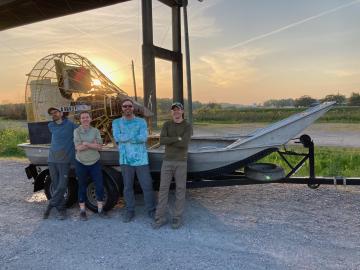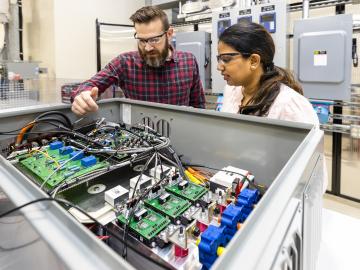
Filter News
Area of Research
- (-) Biology and Environment (30)
- (-) Energy Science (29)
- (-) National Security (30)
- (-) Nuclear Science and Technology (6)
- Advanced Manufacturing (1)
- Biology and Soft Matter (1)
- Electricity and Smart Grid (1)
- Fuel Cycle Science and Technology (1)
- Fusion and Fission (4)
- Isotopes (2)
- Materials (35)
- Materials for Computing (6)
- Neutron Science (12)
- Quantum information Science (1)
- Supercomputing (36)
News Topics
- (-) Advanced Reactors (6)
- (-) Big Data (11)
- (-) Grid (16)
- (-) Materials Science (10)
- (-) Nanotechnology (5)
- (-) National Security (25)
- (-) Physics (2)
- (-) Polymers (2)
- 3-D Printing/Advanced Manufacturing (26)
- Artificial Intelligence (13)
- Bioenergy (36)
- Biology (47)
- Biomedical (12)
- Biotechnology (8)
- Buildings (11)
- Chemical Sciences (7)
- Clean Water (11)
- Composites (3)
- Computer Science (24)
- Coronavirus (12)
- Cybersecurity (13)
- Energy Storage (21)
- Environment (73)
- Exascale Computing (4)
- Fossil Energy (1)
- Frontier (3)
- Fusion (6)
- High-Performance Computing (15)
- Hydropower (6)
- Isotopes (2)
- Machine Learning (12)
- Materials (7)
- Mathematics (4)
- Mercury (7)
- Microelectronics (1)
- Microscopy (9)
- Molten Salt (1)
- Neutron Science (6)
- Nuclear Energy (20)
- Partnerships (6)
- Quantum Science (2)
- Security (8)
- Simulation (9)
- Space Exploration (2)
- Summit (9)
- Transportation (17)
Media Contacts

Researchers at the Department of Energy’s Oak Ridge National Laboratory are supporting the grid by improving its smallest building blocks: power modules that act as digital switches.

Tristen Mullins enjoys the hidden side of computers. As a signals processing engineer for ORNL, she tries to uncover information hidden in components used on the nation’s power grid — information that may be susceptible to cyberattacks.

Nature-based solutions are an effective tool to combat climate change triggered by rising carbon emissions, whether it’s by clearing the skies with bio-based aviation fuels or boosting natural carbon sinks.

As a biogeochemist at ORNL, Matthew Berens studies how carbon, nutrients and minerals move through water and soil. In this firsthand account, Berens describes recent fieldwork in Louisiana with colleagues.

Inspired by one of the mysteries of human perception, an ORNL researcher invented a new way to hide sensitive electric grid information from cyberattack: within a constantly changing color palette.

Climate change often comes down to how it affects water, whether it’s for drinking, electricity generation, or how flooding affects people and infrastructure. To better understand these impacts, ORNL water resources engineer Sudershan Gangrade is integrating knowledge ranging from large-scale climate projections to local meteorology and hydrology and using high-performance computing to create a holistic view of the future.

Using disinformation to create political instability and battlefield confusion dates back millennia. However, today’s disinformation actors use social media to amplify disinformation that users knowingly or, more often, unknowingly perpetuate. Such disinformation spreads quickly, threatening public health and safety. Indeed, the COVID-19 pandemic and recent global elections have given the world a front-row seat to this form of modern warfare.

Researchers at ORNL are helping modernize power management and enhance reliability in an increasingly complex electric grid.

Four nuclear nonproliferation staff members from the Department of Energy’s Oak Ridge National Laboratory were recognized as part of the 2021 Outstanding Security Team awarded by the Secretary of Energy for contributions to the Material Control and Accountability Technical Qualification Program Pilot.

Stephen Dahunsi’s desire to see more countries safely deploy nuclear energy is personal. Growing up in Nigeria, he routinely witnessed prolonged electricity blackouts as a result of unreliable energy supplies. It’s a problem he hopes future generations won’t have to experience.


